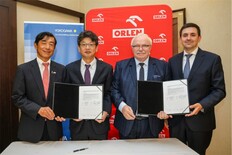- ORLEN targets 70,000 tonnes of synthetic aviation fuel annually by 2030.
- The production process uses carbon dioxide and green hydrogen.
- A digital twin will be created to optimize production processes.
- Synthetic fuels can use existing petroleum fuel infrastructure.

Partnership for Sustainable Aviation Fuel
ORLEN and Yokogawa Europe have signed a Memorandum of Understanding to initiate industrial-scale production of carbon-neutral synthetic aviation fuels. This collaboration aims to enhance the process of synthesizing fuel from carbon dioxide and green hydrogen, positioning ORLEN as a leader in the decarbonization of the aviation industry.
Production Goals and Technology
ORLEN plans to achieve a production capacity of 70,000 tonnes of synthetic aviation fuel annually by 2030. The partnership will develop an integrated management solution, including a digital twin of the production facility, to simulate and optimize production processes. This approach focuses on selecting the most economically viable and environmentally sustainable synthesis methods.
Environmental Impact
Synthetic fuels are produced by combining hydrogen, generated through electrolysis powered by renewable energy, with carbon dioxide sourced from various industrial processes. This method can significantly reduce industrial greenhouse gas emissions. Synthetic fuels have properties nearly identical to conventional petroleum products, allowing their use in existing combustion engines and infrastructure without modifications.
Future Prospects
The production facility for synthetic fuels is expected to be completed by the end of 2030. The aviation industry is anticipated to be the primary consumer of these fuels, benefiting from reduced greenhouse gas emissions and the ability to use existing logistics infrastructure. This partnership aims to expedite and economize the decarbonization of the aviation sector.

